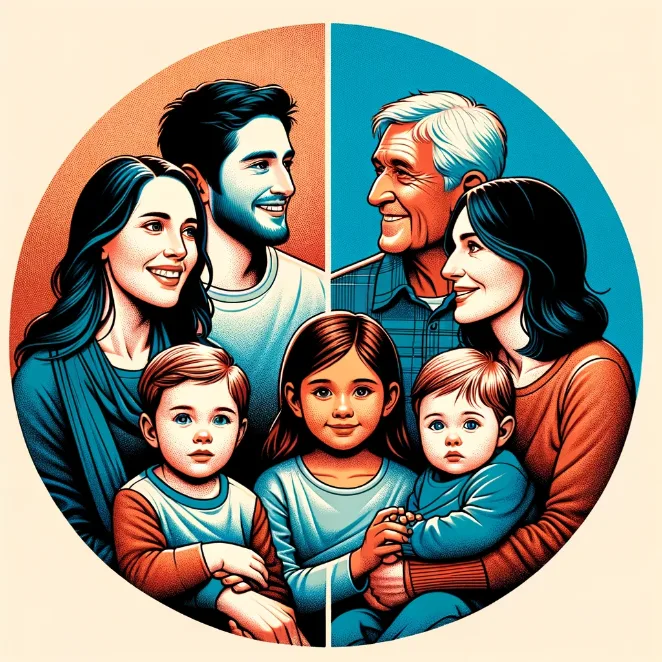
The Impact of Family Background on Compatibility
The impact of one's family background on relationship compatibility is a complex and often understated aspect of romantic connections. The family environment we grow up in shapes our attitudes, beliefs, and behaviors in relationships. This article explores various family backgrounds and their potential influence on romantic compatibility, offering insights into how these dynamics play out in adult relationships.
article by Sofia Ferguson
Traditional Family Structures
Individuals nurtured in traditional family environments often grow up with a deep-rooted understanding of familial hierarchy and a high regard for familial bonds. They tend to value long-term commitments and prioritize family well-being in their life decisions. Such individuals often look for partners who resonate with these values, seeking a sense of continuity and familiarity in their relationships. They may also have strong views on maintaining cultural or religious traditions, seeing them as vital to family cohesion. However, this deep-seated adherence to tradition can pose challenges in relationships with partners who value independence and modernity, potentially leading to conflicts. These individuals might struggle with balancing the expectations set by their traditional upbringing with the evolving dynamics of modern relationships. Nevertheless, their strong commitment to family values often makes them reliable and dedicated partners.

Non-Traditional and Blended Families
Individuals from non-traditional or blended families often cultivate a unique perspective on relationships and family dynamics. Their experiences might lead them to value open communication and inclusivity in their personal relationships. They tend to be more accepting of unconventional relationship models and may prioritize emotional bonds over traditional familial structures. These individuals are often adept at navigating complex family dynamics, a skill that can translate into patience and understanding in romantic relationships. However, they may face challenges in establishing their definition of a stable family life, especially if they have experienced significant changes in their family structure. Their approach to relationships might include a conscious effort to avoid the pitfalls they observed in their family life, striving for a sense of stability they may have felt was lacking in their upbringing.
Single-Parent Families
For individuals raised in single-parent families, the experience often instills a blend of resilience, self-sufficiency, and a keen appreciation for the complexities of relationships. They may possess a strong sense of loyalty and a protective attitude towards their loved ones, having witnessed the struggles and strengths of a single parent. In relationships, they might value transparency and straightforwardness, having learned the importance of clear communication from their family dynamics. However, the absence of one parent could lead to an idealization or aversion to certain traits in potential partners, reflecting the longing or resentment carried from childhood. These individuals might either seek partners who fill the void left by the absent parent or avoid those who remind them of that absence. Developing an awareness of these tendencies is vital for them to build balanced and healthy romantic relationships.

Families with Conflict or Trauma
Individuals who grow up in environments marked by conflict or trauma often carry a heightened sensitivity to relationship dynamics. They may either become conflict-averse, avoiding confrontation at all costs, or find themselves in relationships that echo the turmoil of their upbringing. These experiences can lead to a deep-seated need for stability and peace in their personal relationships, or conversely, a subconscious gravitation towards chaotic or intense dynamics. Trust and security often become central themes in their romantic relationships, as they seek to create the safe haven they might have missed in their childhood. It's common for these individuals to either become overly cautious in forming new relationships or to repeat cycles of conflict unknowingly. Recognizing and addressing these patterns through therapy, introspection, and open communication can be key to forming healthier and more fulfilling relationships.
The Role of Communication and Emotional Intelligence
Regardless of family background, the development of good communication skills and emotional intelligence plays a crucial role in relationship compatibility. These skills help individuals navigate differences in family upbringing, manage expectations, and build strong, empathetic connections with their partners.

Family background undeniably influences relationship compatibility, but it doesn't determine it. Awareness of one's own family influences, open communication, and a willingness to understand and integrate different perspectives are key to building a compatible and fulfilling relationship.
Published: 11/14/2023
Modified: 11/14/2023
More predictions
Come back here soon to learn more about yourself and your future


Harmony In Balance: The Key To Compatibility
In the bustling heart of the city, Maya, a successful corporate lawyer, constantly found herself swamped with work. Leo, on the other hand, was a yoga instructor who embraced the serenity of nature and the calm it brought. Their worlds were starkly different, yet when their paths crossed during a weekend retreat, a unique bond formed, illuminating the importance of life balance in compatibility.


Unveiling the 5 Pillars of Compatibility
Compatibility is a complex and multifaceted concept, especially when it comes to relationships. It’s not just about sharing common interests or having great chemistry; it’s about deeper connections and mutual understanding. This article delves into the five pillars of compatibility, essential elements that contribute to the strength and longevity of a relationship. Understanding these pillars can provide valuable insights into the dynamics of your current or future relationships.


The Science Behind Harmonious Bonds
In a modern research facility, Dr. Adrian, a renowned behavioral scientist, organized a symposium titled "The Science Behind Compatibility." Scholars from various disciplines gathered, eager to dissect the intricate dance of human relationships through a scientific lens.